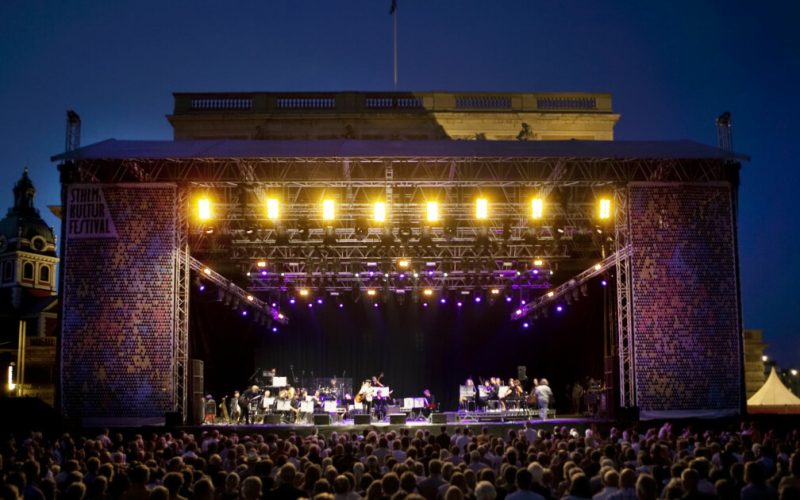Music tourism has experienced a remarkable surge in recent years, transforming it into a significant sector within the broader tourism industry. This article delves into the phenomenon of music tourism, exploring its growth, impact, and the top destinations that have emerged as hotspots for music enthusiasts around the globe. The rise of music tourism has not only enriched the cultural landscape but also contributed substantially to the economies of various regions.
Understanding Music Tourism
Music tourism refers to the travel undertaken by individuals primarily for the purpose of experiencing music-related activities. This includes attending concerts, music festivals, visiting iconic music landmarks, and participating in music-themed tours. The concept is not new, but its scale and impact have grown exponentially in the digital age, where access to information and ease of travel have made it more feasible for fans to follow their favorite artists and genres around the world.

Factors Driving the Rise of Music Tourism
- Globalization of Music: The advent of the internet and streaming services has made music more accessible than ever before. Fans can discover artists from different parts of the world and are often willing to travel to experience live performances.
- Social Media Influence: Platforms like Instagram, Facebook, and Twitter allow fans to connect with artists and fellow enthusiasts, sharing experiences and creating a sense of community that transcends geographical boundaries.
- Economic Impact: Cities and regions have recognized the economic benefits of hosting music events, leading to increased investment in infrastructure and marketing to attract tourists.
- Cultural Exchange: Music tourism facilitates cultural exchange, allowing tourists to immerse themselves in the local culture and traditions of the destination.
- Memorable Experiences: The unique and often unforgettable experiences associated with live music events drive repeat tourism and word-of-mouth promotion.
Top Concert Destinations
The rise of music tourism has put several cities and regions on the map as top concert destinations. These locations are renowned for their vibrant music scenes, iconic venues, and annual festivals that draw crowds from around the world.
Nashville, Tennessee, USA
Known as “Music City,” Nashville is synonymous with country music. The city boasts legendary venues such as the Grand Ole Opry and the Ryman Auditorium. The annual CMA Music Festival is a major draw, attracting fans from across the globe.
Austin, Texas, USA
Austin bills itself as the “Live Music Capital of the World.” The city hosts the South by Southwest (SXSW) festival, which features a diverse lineup of music, film, and interactive media. Austin City Limits, another major festival, showcases a wide range of genres.
Berlin, Germany
Berlin’s music scene is diverse and vibrant, with a strong emphasis on electronic music. The city is home to iconic clubs like Berghain and hosts numerous music festivals, including the Berlin Festival and Lollapalooza Berlin.
London, England
London’s rich musical heritage makes it a top destination for music tourists. The city offers a plethora of venues, from the historic Royal Albert Hall to the modern O2 Arena. Major events like the British Summer Time Hyde Park festival attract international audiences.
New Orleans, Louisiana, USA
New Orleans is the birthplace of jazz and continues to be a hub for music lovers. The New Orleans Jazz & Heritage Festival is a cornerstone event, celebrating the city’s musical and cultural legacy.
Tokyo, Japan
Tokyo’s music scene is a blend of traditional and contemporary influences. The city hosts a range of music festivals, including the Fuji Rock Festival and Summer Sonic. Tokyo’s live houses and clubs offer intimate settings for diverse musical performances.

Barcelona, Spain
Barcelona is known for its vibrant music festivals, particularly Primavera Sound and Sónar. These events attract a global audience and feature a mix of established and emerging artists.
Montreal, Canada
Montreal’s music scene is eclectic and dynamic. The city hosts the Montreal International Jazz Festival, one of the largest jazz festivals in the world. Osheaga, another major festival, features a diverse lineup of artists.
Rio de Janeiro, Brazil
Rio’s music scene is deeply rooted in samba and bossa nova. The city’s iconic Carnival is a massive draw, featuring parades, music, and dance. Rock in Rio, one of the world’s largest music festivals, also takes place here.
Melbourne, Australia
Melbourne is known for its vibrant live music scene, with numerous venues and festivals throughout the year. The Melbourne International Jazz Festival and the St Kilda Festival are major highlights.
Economic and Cultural Impact
The rise of music tourism has had a profound economic and cultural impact on these destinations. Economically, it generates significant revenue through ticket sales, accommodation, dining, and other tourism-related expenditures. Culturally, it fosters a sense of community and pride among local residents, while also promoting the destination’s cultural heritage to a global audience.
Conclusion
The rise of music tourism has transformed the way people experience music and travel. As fans continue to seek out unique and memorable musical experiences, the industry is poised for further growth. The top concert destinations highlighted in this article are just a few examples of the many places where music and tourism intersect, creating vibrant and dynamic cultural landscapes. Whether it’s the historic venues of Nashville or the eclectic festivals of Barcelona, music tourism offers something for every enthusiast, making it a powerful and enduring trend in the global tourism industry.










